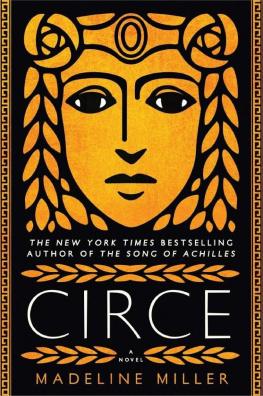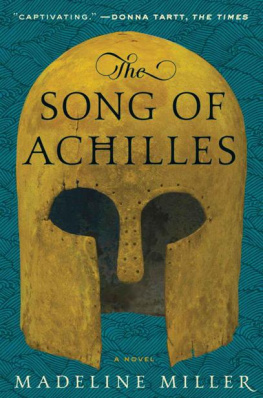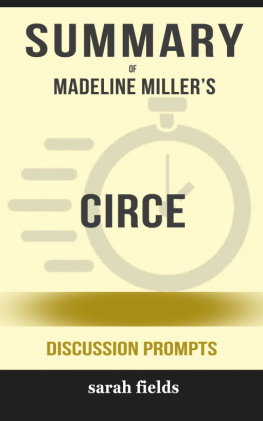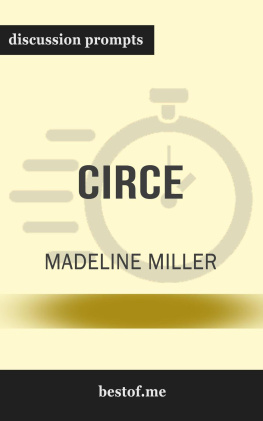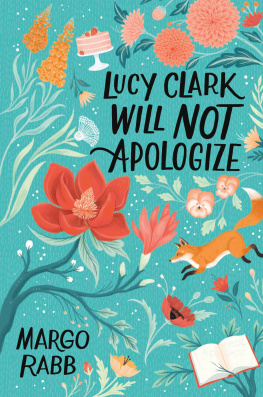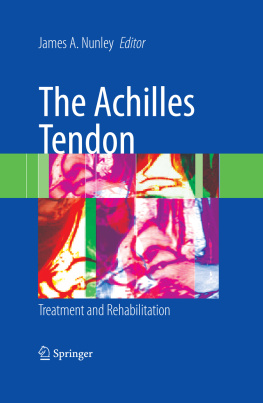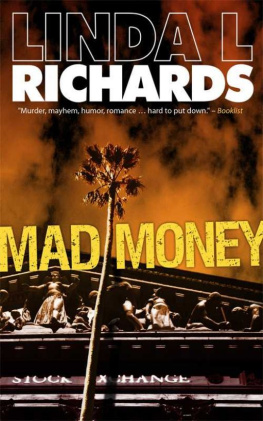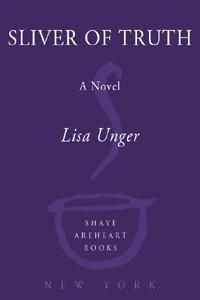Madeline Miller - Circe
Here you can read online Madeline Miller - Circe full text of the book (entire story) in english for free. Download pdf and epub, get meaning, cover and reviews about this ebook. year: 2018, publisher: Little, Brown, genre: Prose. Description of the work, (preface) as well as reviews are available. Best literature library LitArk.com created for fans of good reading and offers a wide selection of genres:
Romance novel
Science fiction
Adventure
Detective
Science
History
Home and family
Prose
Art
Politics
Computer
Non-fiction
Religion
Business
Children
Humor
Choose a favorite category and find really read worthwhile books. Enjoy immersion in the world of imagination, feel the emotions of the characters or learn something new for yourself, make an fascinating discovery.
- Book:Circe
- Author:
- Publisher:Little, Brown
- Genre:
- Year:2018
- Rating:5 / 5
- Favourites:Add to favourites
- Your mark:
- 100
- 1
- 2
- 3
- 4
- 5
Circe: summary, description and annotation
We offer to read an annotation, description, summary or preface (depends on what the author of the book "Circe" wrote himself). If you haven't found the necessary information about the book — write in the comments, we will try to find it.
Circe — read online for free the complete book (whole text) full work
Below is the text of the book, divided by pages. System saving the place of the last page read, allows you to conveniently read the book "Circe" online for free, without having to search again every time where you left off. Put a bookmark, and you can go to the page where you finished reading at any time.
Font size:
Interval:
Bookmark:
The characters and events in this book are fictitious. Any similarity to real persons, living or dead, is coincidental and not intended by the author.
Copyright 2018 by Madeline Miller
Cover design by Will Staehle
Author photograph by Nina Subin
Cover copyright 2018 by Hachette Book Group, Inc.
Hachette Book Group supports the right to free expression and the value of copyright. The purpose of copyright is to encourage writers and artists to produce the creative works that enrich our culture.
The scanning, uploading, and distribution of this book without permission is a theft of the authors intellectual property. If you would like permission to use material from the book (other than for review purposes), please contact permissions@hbgusa.com. Thank you for your support of the authors rights.
Little, Brown and Company
Hachette Book Group
1290 Avenue of the Americas, New York, NY 10104
littlebrown.com
facebook.com/littlebrownandcompany
twitter.com/littlebrown
First ebook edition: April 2018
Little, Brown and Company is a division of Hachette Book Group, Inc. The Little, Brown name and logo are trademarks of Hachette Book Group, Inc.
The publisher is not responsible for websites (or their content) that are not owned by the publisher.
The Hachette Speakers Bureau provides a wide range of authors for speaking events. To find out more, go to hachettespeakersbureau.com or call (866) 376-6591.
ISBN 978-0-316-55633-0
E3-20180228-NF-DA
WHEN I WAS BORN, the name for what I was did not exist. They called me nymph, assuming I would be like my mother and aunts and thousand cousins. Least of the lesser goddesses, our powers were so modest they could scarcely ensure our eternities. We spoke to fish and nurtured flowers, coaxed drops from the clouds or salt from the waves. That word, nymph, paced out the length and breadth of our futures. In our language, it means not just goddess, but bride.
My mother was one of them, a naiad, guardian of fountains and streams. She caught my fathers eye when he came to visit the halls of her own father, Oceanos. Helios and Oceanos were often at each others tables in those days. They were cousins, and equal in age, though they did not look it. My father glowed bright as just-forged bronze, while Oceanos had been born with rheumy eyes and a white beard to his lap. Yet they were both Titans, and preferred each others company to those new-squeaking gods upon Olympus who had not seen the making of the world.
Oceanos palace was a great wonder, set deep in the earths rock. Its high-arched halls were gilded, the stone floors smoothed by centuries of divine feet. Through every room ran the faint sound of Oceanos river, source of the worlds fresh waters, so dark you could not tell where it ended and the rock-bed began. On its banks grew grass and soft gray flowers, and also the unnumbered children of Oceanos, naiads and nymphs and river-gods. Otter-sleek, laughing, their faces bright against the dusky air, they passed golden goblets among themselves and wrestled, playing games of love. In their midst, outshining all that lily beauty, sat my mother.
Her hair was a warm brown, each strand so lustrous it seemed lit from within. She would have felt my fathers gaze, hot as gusts from a bonfire. I see her arrange her dress so it drapes just so over her shoulders. I see her dab her fingers, glinting, in the water. I have seen her do a thousand such tricks a thousand times. My father always fell for them. He believed the worlds natural order was to please him.
Who is that? my father said to Oceanos.
Oceanos had many golden-eyed grandchildren from my father already, and was glad to think of more. My daughter Perse. She is yours if you want her.
The next day, my father found her by her fountain-pool in the upper world. It was a beautiful place, crowded with fat-headed narcissus, woven over with oak branches. There was no muck, no slimy frogs, only clean, round stones giving way to grass. Even my father, who cared nothing for the subtleties of nymph arts, admired it.
My mother knew he was coming. Frail she was, but crafty, with a mind like a spike-toothed eel. She saw where the path to power lay for such as her, and it was not in bastards and riverbank tumbles. When he stood before her, arrayed in his glory, she laughed at him. Lie with you? Why should I?
My father, of course, might have taken what he wanted. But Helios flattered himself that all women went eager to his bed, slave girls and divinities alike. His altars smoked with the proof, offerings from big-bellied mothers and happy by-blows.
It is marriage, she said to him, or nothing. And if it is marriage, be sure: you may have what girls you like in the field, but you will bring none home, for only I will hold sway in your halls.
Conditions, constrainment. These were novelties to my father, and gods love nothing more than novelty. A bargain, he said, and gave her a necklace to seal it, one of his own making, strung with beads of rarest amber. Later, when I was born, he gave her a second strand, and another for each of my three siblings. I do not know which she treasured more: the luminous beads themselves or the envy of her sisters when she wore them. I think she would have gone right on collecting them into eternity until they hung from her neck like a yoke on an ox if the high gods had not stopped her. By then they had learned what the four of us were. You may have other children, they told her, only not with him. But other husbands did not give amber beads. It was the only time I ever saw her weep.
At my birth, an auntI will spare you her name because my tale is full of auntswashed and wrapped me. Another tended to my mother, painting the red back on her lips, brushing her hair with ivory combs. A third went to the door to admit my father.
A girl, my mother said to him, wrinkling her nose.
But my father did not mind his daughters, who were sweet-tempered and golden as the first press of olives. Men and gods paid dearly for the chance to breed from their blood, and my fathers treasury was said to rival that of the king of the gods himself. He placed his hand on my head in blessing.
She will make a fair match, he said.
How fair? my mother wanted to know. This might be consolation, if I could be traded for something better.
My father considered, fingering the wisps of my hair, examining my eyes and the cut of my cheeks.
A prince, I think.
A prince? my mother said. You do not mean a mortal?
The revulsion was plain on her face. Once when I was young I asked what mortals looked like. My father said, You may say they are shaped like us, but only as the worm is shaped like the whale.
My mother had been simpler: like savage bags of rotten flesh.
Surely she will marry a son of Zeus, my mother insisted. She had already begun imagining herself at feasts upon Olympus, sitting at Queen Heras right hand.
No. Her hair is streaked like a lynx. And her chin. There is a sharpness to it that is less than pleasing.
My mother did not argue further. Like everyone, she knew the stories of Helios temper when he was crossed. However gold he shines, do not forget his fire.
She stood. Her belly was gone, her waist reknitted, her cheeks fresh and virgin-rosy. All our kind recover quickly, but she was faster still, one of the daughters of Oceanos, who shoot their babes like roe.
Come, she said. Let us make a better one.
I grew quickly. My infancy was the work of hours, my toddlerhood a few moments beyond that. An aunt stayed on hoping to curry favor with my mother and named me Hawk, Circe, for my yellow eyes, and the strange, thin sound of my crying. But when she realized that my mother no more noticed her service than the ground at her feet, she vanished.
Next pageFont size:
Interval:
Bookmark:
Similar books «Circe»
Look at similar books to Circe. We have selected literature similar in name and meaning in the hope of providing readers with more options to find new, interesting, not yet read works.
Discussion, reviews of the book Circe and just readers' own opinions. Leave your comments, write what you think about the work, its meaning or the main characters. Specify what exactly you liked and what you didn't like, and why you think so.

